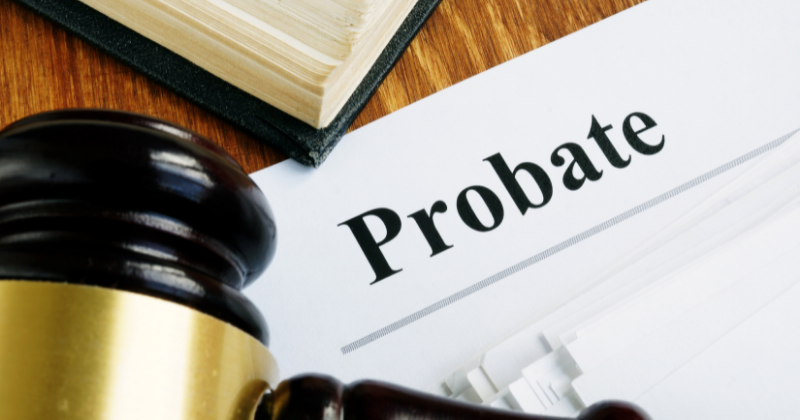What will happen to your home when you die? Will it get passed on seamlessly to your heirs? Or will the government and creditors get some or all of it?
What if you become incapacitated later in life and cannot care for your home? What will happen?
Those are touchy questions, but the first set of questions is inevitable, and the second is possible. If we care about what happens to our home and those who will inherit it, these are discussions we need to have, and there are actions we need to take to be prepared.
In this article, we focus on the benefits of putting our home in a Trust. Estate planning is a HUGE topic, and there are a few essential concepts to understand. Below is a list of terms that will be helpful to know as we dive into the topic of your home and Trusts.
- Probate is the judicial process your estate goes through when you die. The court oversees the estate to ensure debts are paid, and your assets are distributed according to your wishes (as conveyed in your Will).
- Probate Assets include anything with only the decedent’s name on it upon death. These assets go through probate. Examples include bank accounts, insurance policies, retirement or investment accounts, and real estate.
- A Will is a legal document that names whom you want to receive your property upon your death. It defines final wishes and nominates a guardian for surviving minor children.
- Intestate Succession occurs if you die without a Will. Your property is distributed according to our state’s laws regarding intestate succession.
- A Trust is a legal arrangement that holds your assets during your lifetime and allows them to be distributed to the people you choose upon your death or at any time. Unlike a Will, a Living Trust avoids probate.
- In a Revocable Trust, also called a Living Trust, you can change the property in your Trust, the beneficiaries, when and how assets are distributed, and even the existence of the Trust itself.
- An Irrevocable Trust is one you cannot amend, modify or revoke except under certain circumstances. It moves assets out of your name and control, eventually being transferred to the next generation. It reduces the value of your estate, which can lower your taxes and protect your assets from creditors.
- The Trustee is an individual, an institution, or a combination of both responsible for managing the property owned by a Trust for the welfare of the beneficiaries. The Trustee who takes over the Trust after you is called a “Successor Trustee.”
- Estate Planning is the process by which an individual or family arranges the transfer of assets in anticipation of death, often utilizing the tools above (Wills and Trusts).
Will vs. Trust
Both a Will and a Trust allow you to make your wishes known, choose a person or persons to settle your affairs on your behalf and decide who receives your assets upon your passing or before. Well-planned estates often utilize both Trusts and Wills. You might put a few large assets, such as your home, in a Trust and cover other things in your Will.
One significant difference is that with a Will alone, your assets still must go through probate court before your heirs can receive them. Thus, avoiding probate is one of the main reasons to put your home and other assets in a Trust, but several other advantages exist.
Reasons to Put Your Real Estate in a Trust
If you’re like the average homeowner, your house is likely your most valuable asset. You have loved ones who live in it, depend on it and expect to inherit it when you die. Having a plan for your home can make life easier for everyone when you pass away – or at any time if you choose to transfer assets before then.
There are a variety of reasons to include a Trust in your estate plan and to include your home in that Trust, including avoiding probate, maintaining control of your assets, providing for and making things easier for family and heirs, planning for incapacity, and ensuring privacy.
Avoiding Probate: Probate can be a long and drawn-out process. It can typically take about 5 or 6 months to handle correctly. If you die intestate (without a Will), probate can take longer and result in some possible conflicts among heirs. That can require additional time and costs, reducing the remaining value of your assets.
A Living Trust avoids probate court. When you create a Trust and retitle your assets into the name of your Trust, you have performed what some refer to as “Living Probate.” Removing the assets out of our name won’t be necessary for a probate process to accomplish that task.
Your “Successor Trustee” (the person named to manage your Trust upon your death or incapacity) will have immediate authority to manage the Trust assets; court appointment is unnecessary. Any assets in your Trust can be distributed in a matter of weeks after your death, not months.

Maintaining Control of Your Assets: A Trust can give you better control over your assets than a Will. When you name yourself as a Trustee, you retain control of the assets during your lifetime. A Trust provides flexibility — even creativity — with the control that a Will alone might not.
Most people think estate planning is about their death, but it’s not. It’s about control over your assets — control while you’re living and control after your death
Providing for Family and Heirs: You likely want your family and heirs to inherit your home without going through the long, stressful, and expensive probate court process. Your home can be transferred more quickly through the Trust and can be done privately.
Planning For Incapacity: Putting your home in a Trust doesn’t only protect your assets when you die; it’s also essential in the event you become incapacitated. Should you become ill and unable to manage your home and finances, another Trustee can oversee your Trust and protect your home. This can provide continuity and reassurance if you become disabled or mentally incapacitated.
Privacy: Privacy is important to some, but when your estate goes through probate, with a Will or without, your estate becomes public—an open court record. A Living Trust is private, so no one will know what your assets were and who inherited them or didn’t.
What Trusts Don’t Do
There are many types of Trusts. In addition to the basic common Trusts, there are charitable Trusts, asset protection Trusts, special needs and elderly care Trusts, and many more. The most common type of Trust discussed here – the Revocable or Living Trust – does not accomplish everything, so it’s important to talk with a qualified financial adviser or estate planning attorney to ensure you are creating the best Trust for your needs.

Taxes & Creditors: Many think Trusts will protect their assets from taxation, reduce their tax liability, or protect their assets from creditors. The revocable Trust does not do any of these things. During your lifetime, assets in a Revocable Trust are subject to the taxman and the claims of your creditors as if you owned them in your personal name. There are no special tax returns or accountings required. You maintain the same tax ID number, file the same income tax returns, and more.
There are more complex types of Trusts (Irrevocable Trusts) that can protect you in these ways that are beyond the scope of this article, but you can ask your estate attorney about those Trusts if you need them.
Downside of Trust: The downsides of putting your home in a revocable Trust are limited. It usually costs more to set up a Trust and file documents with the court than to create a Will. The amount of legal time required varies depending on the number and type of assets you have. Regardless of the legal fees involved, it likely will be much less than the cost of probate.
Quick Tips for Your Trust
When you form a Trust for your home, you should include all your significant investments: bank accounts, insurance policies, retirement or investment accounts, and other home or property investments.
If you already have a Trust, you can add your home anytime, even if you’re still paying a mortgage on the home. Moving to the Trust won’t trigger a “due on sale” clause. If you have a mortgage, notify your lender that you’re putting the property in a Trust to avoid confusion later.
Professional Guidance: To place your home in a Trust, ask your attorney to amend your Trust and draw up a new property deed in the Trust’s name. Work with a qualified estate planning attorney or Trust officer to protect your assets and beneficiaries. It is important to find experts specializing in Trust work and estate planning who spend most of their time doing such work.
If you don’t have an estate attorney, you can start your search on the Florida Bar website, where “estate attorneys” are specifically identified. You also can contact Robert Coscia, Broker/Owner of Personal Realty Advisers, for referrals to several trusted estate planners. Robert is a Certified Probate Real Estate Specialist who can help with real estate sales and needs during probate, but he prefers to help you avoid probate altogether. Contact him directly to discuss plans for protecting your home for the future: Personal Realty Advisers, by phone at 727-317-7653 (SOLD) or email at info@PRAFlorida.com. We look forward to hearing from you.
Trusts are complex legal instruments. Nothing in this article is intended to be taken as legal advice instead, we hope to plant the seed for you to seek legal counsel if you think this might be a tool that can benefit you.



Leave a Reply